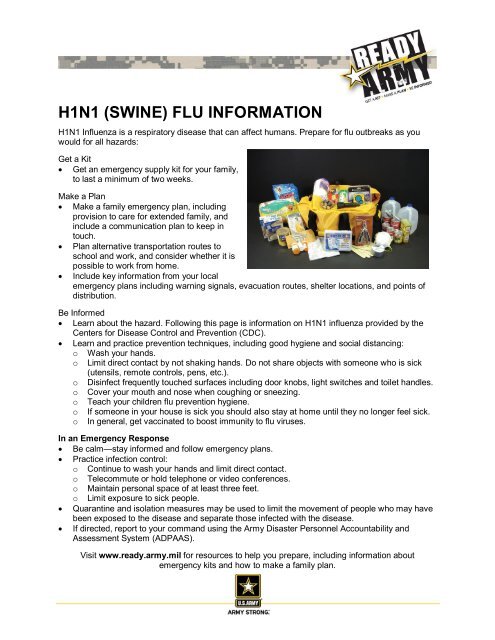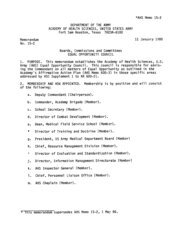H1N1 (SWINE) FLU INFORMATION - Fort Sam Houston
H1N1 (SWINE) FLU INFORMATION - Fort Sam Houston
H1N1 (SWINE) FLU INFORMATION - Fort Sam Houston
Create successful ePaper yourself
Turn your PDF publications into a flip-book with our unique Google optimized e-Paper software.
<strong>H1N1</strong> (<strong>SWINE</strong>) <strong>FLU</strong> <strong>INFORMATION</strong><br />
<strong>H1N1</strong> Influenza is a respiratory disease that can affect humans. Prepare for flu outbreaks as you<br />
would for all hazards:<br />
Get a Kit<br />
• Get an emergency supply kit for your family,<br />
to last a minimum of two weeks.<br />
Make a Plan<br />
• Make a family emergency plan, including<br />
provision to care for extended family, and<br />
include a communication plan to keep in<br />
touch.<br />
• Plan alternative transportation routes to<br />
school and work, and consider whether it is<br />
possible to work from home.<br />
• Include key information from your local<br />
emergency plans including warning signals, evacuation routes, shelter locations, and points of<br />
distribution.<br />
Be Informed<br />
• Learn about the hazard. Following this page is information on <strong>H1N1</strong> influenza provided by the<br />
Centers for Disease Control and Prevention (CDC).<br />
• Learn and practice prevention techniques, including good hygiene and social distancing:<br />
o Wash your hands.<br />
o Limit direct contact by not shaking hands. Do not share objects with someone who is sick<br />
(utensils, remote controls, pens, etc.).<br />
o Disinfect frequently touched surfaces including door knobs, light switches and toilet handles.<br />
o Cover your mouth and nose when coughing or sneezing.<br />
o Teach your children flu prevention hygiene.<br />
o If someone in your house is sick you should also stay at home until they no longer feel sick.<br />
o In general, get vaccinated to boost immunity to flu viruses.<br />
In an Emergency Response<br />
• Be calm—stay informed and follow emergency plans.<br />
• Practice infection control:<br />
o Continue to wash your hands and limit direct contact.<br />
o Telecommute or hold telephone or video conferences.<br />
o Maintain personal space of at least three feet.<br />
o Limit exposure to sick people.<br />
• Quarantine and isolation measures may be used to limit the movement of people who may have<br />
been exposed to the disease and separate those infected with the disease.<br />
• If directed, report to your command using the Army Disaster Personnel Accountability and<br />
Assessment System (ADPAAS).<br />
Visit www.ready.army.mil for resources to help you prepare, including information about<br />
emergency kits and how to make a family plan.<br />
1
What is <strong>H1N1</strong> flu?<br />
<strong>H1N1</strong> influenza (<strong>H1N1</strong> flu) is a respiratory disease of pigs caused by type A influenza viruses that<br />
causes regular outbreaks in pigs. People do not normally get <strong>H1N1</strong> flu, but human infections can<br />
and do happen. <strong>H1N1</strong> flu viruses have been reported to spread from person to person, but in the<br />
past, this transmission was limited and not sustained beyond three people.<br />
Are there human infections with <strong>H1N1</strong> flu in the United States?<br />
In late March and early April 2009, cases of human infection with <strong>H1N1</strong> influenza A (<strong>H1N1</strong>) viruses<br />
were first reported in Southern California and near San Antonio, Texas. Other U.S. states have<br />
reported cases of <strong>H1N1</strong> flu infection in humans, and cases have been reported internationally as<br />
well. CDC keeps an updated case count of confirmed <strong>H1N1</strong> flu infections in the United States (<br />
www.cdc.gov/<strong>H1N1</strong>flu/investigation.htm), and local and state health agencies are working together<br />
to investigate this situation.<br />
Is this <strong>H1N1</strong> flu virus contagious?<br />
CDC has determined that this <strong>H1N1</strong> influenza A (<strong>H1N1</strong>) virus is contagious and is spreading from<br />
human to human. However, at this time, it not known how easily the virus spreads between people.<br />
How serious is <strong>H1N1</strong> flu infection?<br />
Like seasonal flu, <strong>H1N1</strong> flu in humans can vary in severity from mild to severe. From 2005 until<br />
January 2009, 12 human cases of <strong>H1N1</strong> flu were detected in the United States, with no deaths<br />
occurring. However, <strong>H1N1</strong> flu infection can be serious. In September 1988, a previously healthy 32<br />
yearold pregnant woman in Wisconsin was hospitalized for pneumonia after being infected with<br />
<strong>H1N1</strong> flu and died eight days later. A <strong>H1N1</strong> flu outbreak in <strong>Fort</strong> Dix, New Jersey occurred in 1976<br />
that caused more than 200 cases with serious illness in several people and one death.<br />
What are the signs and symptoms of <strong>H1N1</strong><br />
flu in people?<br />
The symptoms of <strong>H1N1</strong> flu in people are similar<br />
to the symptoms of regular human flu and<br />
include fever, cough, sore throat, body aches,<br />
headache, chills and fatigue. Some people have<br />
reported diarrhea and vomiting associated with<br />
<strong>H1N1</strong> flu. In the past, severe illness (pneumonia<br />
and respiratory failure) and deaths have been<br />
reported with <strong>H1N1</strong> flu infection in people. Like<br />
seasonal flu, <strong>H1N1</strong> flu may cause a worsening of<br />
underlying chronic medical conditions.<br />
How does <strong>H1N1</strong> flu spread?<br />
Spread of this <strong>H1N1</strong> influenza A (<strong>H1N1</strong>) virus is thought to be happening in the same way that<br />
seasonal flu spreads. Flu viruses are spread mainly from person to person through coughing or<br />
sneezing of people with influenza. Sometimes people may become infected by touching something<br />
with flu viruses on it and then touching their mouth or nose.<br />
How can someone with the flu infect someone else?<br />
Infected people may be able to infect others beginning one day before symptoms develop and up to<br />
seven or more days after becoming sick. That means that you may be able to pass on the flu to<br />
someone else before you know you are sick, as well as while you are sick.<br />
2
What should I do to keep from getting the flu?<br />
There is no vaccine available right now to protect against <strong>H1N1</strong> flu. There are everyday actions that<br />
can help prevent the spread of germs that cause respiratory illnesses like influenza. Take these<br />
everyday steps to protect your health:<br />
• First and most importantly, wash your hands often<br />
with soap and water, especially after you cough or<br />
sneeze. Wash for at least 15–20 seconds.<br />
Alcoholbased hand cleaners are also effective<br />
and can be used if soap and water are not<br />
available. You can find these cleaners in most<br />
supermarkets and drugstores. If using gel, rub<br />
your hands until the gel is dry. The gel doesn't<br />
need water to work; the alcohol in it kills the<br />
germs on your hands.<br />
• Try not touch surfaces that may be contaminated<br />
with the flu virus.<br />
• Avoid touching your eyes, nose or mouth. Germs spread this way.<br />
• Try to stay in good general health. Get plenty of sleep, be physically active, manage your stress,<br />
drink plenty of fluids and eat nutritious food.<br />
• Try to avoid close contact with sick people.<br />
Are there medicines to treat <strong>H1N1</strong> flu?<br />
Yes. CDC recommends the use of oseltamivir or zanamivir for the treatment and/or prevention of<br />
infection with these <strong>H1N1</strong> influenza viruses. Antiviral drugs are prescription medicines (pills, liquid or<br />
an inhaler) that fight against the flu by keeping flu viruses from reproducing in your body. If you get<br />
sick, antiviral drugs can make your illness milder and make you feel better faster. They may also<br />
prevent serious flu complications. For treatment, antiviral drugs work best if started soon after getting<br />
sick (within two days of symptoms).<br />
How long can an infected person spread <strong>H1N1</strong> flu to others?<br />
People with <strong>H1N1</strong> influenza virus infection should be considered potentially contagious as long as<br />
they are symptomatic and possibly for up to seven days following illness onset. Children, especially<br />
younger children, might potentially be contagious for longer periods.<br />
What surfaces are most likely to be sources of contamination?<br />
Germs can be spread when a person touches something that is contaminated with germs and then<br />
touches his or her eyes, nose or mouth. Droplets from a cough or sneeze of an infected person<br />
move through the air. Germs can be spread when people touch respiratory droplets from another<br />
person on a surface like a desk and then touch their own eyes, mouth or nose before washing their<br />
hands.<br />
How long can viruses live outside the body?<br />
We know that some viruses and bacteria can live two hours or longer on surfaces like cafeteria<br />
tables, doorknobs and desks. Frequent handwashing will help you reduce the chance of getting<br />
contamination from these common surfaces.<br />
3
What should I do if I get sick?<br />
If you live in areas where <strong>H1N1</strong> influenza cases have been identified and become ill with influenza<br />
like symptoms, including fever, body aches, runny nose, sore throat, nausea or vomiting or diarrhea,<br />
you may want to contact your healthcare provider, particularly if you are worried about your<br />
symptoms. Your healthcare provider will determine whether influenza testing or treatment is needed.<br />
If you are sick, you should stay home and avoid contact with other people as much as possible to<br />
keep from spreading your illness to others.<br />
If you become ill and experience any of the following warning signs, seek emergency medical care.<br />
In children emergency warning signs that need urgent medical attention include the following:<br />
• Fast breathing or trouble breathing<br />
• Bluish skin color<br />
• Not drinking enough fluids<br />
• Not waking up or not interacting<br />
• Being so irritable that the child does not want to be held<br />
• Flulike symptoms improve but then return with fever and worse cough<br />
• Fever with a rash<br />
In adults, emergency warning signs that need urgent medical attention include the following:<br />
• Difficulty breathing or shortness of breath<br />
• Pain or pressure in the chest or abdomen<br />
• Sudden dizziness<br />
• Confusion<br />
• Severe or persistent vomiting<br />
What is the best way to keep from spreading the virus through coughing or sneezing?<br />
If you are sick, limit your contact with other people as much as possible. Do not go to work or school.<br />
Cover your mouth and nose with a tissue when coughing or sneezing, and put your used tissue in<br />
the waste basket. This may prevent those around you from getting sick. if you do not have a tissue,<br />
cover your cough or sneeze with your hand, then disinfect your hands as described above.<br />
Can I get <strong>H1N1</strong> influenza from eating or preparing pork?<br />
No. <strong>H1N1</strong> influenza viruses are not spread by food. You cannot get <strong>H1N1</strong> influenza from eating pork<br />
or pork products. Eating properly handled and cooked pork products is safe.<br />
It’s up to you. Prepare strong. Get an emergency supply kit good for at least three days, make<br />
an emergency plan with your family, and be informed about what might happen.<br />
4

















